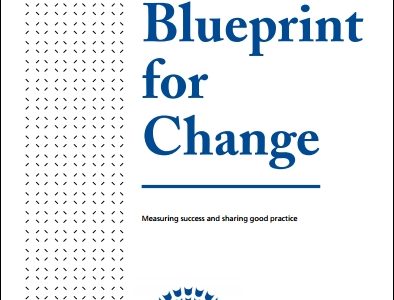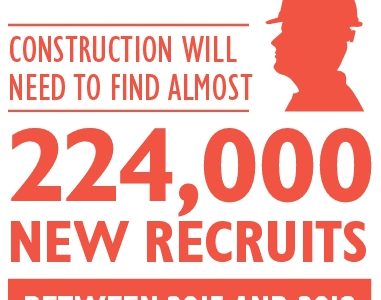One of the UK construction industry’s biggest trade shows, Ecobuild, was held at ExCEL in east London this week. Despite its name, the three-day event is no longer just focused on sustainability, but features a host of seminars and conference sessions to update and inform attendees about various current industry issues. Not surprisingly, the skills shortage was identified as a hot topic, with speakers in the main conference arena discussing the Next Generation yesterday.
Broadcaster Daisy McAndrew introduced Pauline Traetto, academy director of the BRE Academy, who briefly talked about the findings of its latest skills gap survey. She was followed by David Hancock, head of construction at the Cabinet Office, then Suzannah Nichol, chief executive of construction contractors trade body Build UK, with Steven Radley, policy and strategic planning director of the CITB (also a partner on BRE’s research), bringing up the rear. In a short session, the four could do little more than skate over some of the challenges facing the industry, with the new BRE survey providing some useful context.
The skills crisis (again)
 As if we needed reminding, the BRE Academy survey findings (based on 300+ industry respondents, surveyed November 2015 – to January 2016; survey summary here; news release) confirmed:
As if we needed reminding, the BRE Academy survey findings (based on 300+ industry respondents, surveyed November 2015 – to January 2016; survey summary here; news release) confirmed:
- the poor public image of construction – 91% of respondents said people outside the industry have a different perspective on the industry to those within it.
- the continued gender diversity gap (see Let’s share more data on skills and diversity),
- the lack of clear and appealing career pathways (74% of respondents said these should be ‘actively promoted’ – good excuse later for a disco-pounding Build UK video!), and
- skills shortages – in sustainability, environmental and trade skills, plus building information modelling (BIM) and smart technology skills, and – interestingly – communication skills.
BRE Academy Director Pauline Traetto said:
“Construction currently contributes £92 billion a year to the UK economy with a workforce of 3 million people. In order to support future growth in the UK as well as rapid expansion in developing countries a talented, engaged workforce is critical. Only by grappling with the skills shortage highlighted in this report in areas like sustainability and digital design will the industry be able to deliver a low carbon, high performance future.”
Not really a crisis – more a deep structural challenge
Coincidentally, another academy has also just reported findings from its annual trend survey and mentioned communications. Albeit from another small sample, the PR Academy identified crisis communication and public affairs as the top skills gaps among communicators. This set me thinking….
The construction industry skills ‘crisis’ has been a long-standing issue, so is perhaps not what most communication professionals would define as a crisis (usually something which flares up unexpectedly and creates an immediate reputation issue). But the mentions of communication skills and of public affairs were perhaps more appropriate, for the symptoms of the problem were plain to see at Ecobuild.
The UK Government is keenly aware of the need to address the skills shortage and wants industry to help it resolve the issue, but a key challenge is industry fragmentation. Even just focused on the conference platform, we had two bodies – Build UK and CITB – organising seemingly separate campaigns (Build UK showed its Get Into Construction video, while the CITB talked about its three-year Go Construct campaign) to promote the industry. And there are literally hundreds of other construction professional and trade associations – many of which are separately engaged in similar, but often disconnected, campaigns.
But it is not impossible to orchestrate the industry to achieve some major changes. It just takes concerted action (and funding) from the government and from industry to do so. BIM is a particularly topical example.
Follow the BIM example
 In 2009, the appointment of the first chief construction advisor started what has become a powerful modernising movement aimed at making construction and the built environment more cost effective and sustainable (“Cash is King, but Carbon is Queen” was the Paul Morrell mantra). BIM is just a minor part of a suite of changes pushed in successive government construction strategies. But because deployment of BIM was made mandatory for businesses wanting to work on centrally procured public sector projects from April 2016, we have seen an unprecedented effort to change industry practices, cultures and behaviours, as well as technologies, to accommodate this new (still evolving) and more collaborative way of working.
In 2009, the appointment of the first chief construction advisor started what has become a powerful modernising movement aimed at making construction and the built environment more cost effective and sustainable (“Cash is King, but Carbon is Queen” was the Paul Morrell mantra). BIM is just a minor part of a suite of changes pushed in successive government construction strategies. But because deployment of BIM was made mandatory for businesses wanting to work on centrally procured public sector projects from April 2016, we have seen an unprecedented effort to change industry practices, cultures and behaviours, as well as technologies, to accommodate this new (still evolving) and more collaborative way of working.
Breaking down silos is a constant refrain within project teams; progressive clients and their supply chains are also developing longer-term approaches to procurement (frameworks, alliancing, etc); government is demanding “open, shareable asset information”; and we are moving from analogue, largely paper-based processes to digital working.
Such changes will help transform “the image of the industry” but they will do it more quickly if they are sustained by the same government-impelled, pan-industry effort achieved to push collaborative BIM and related commercial, legal and cultural changes. In short, the BIM campaign has progressed because it has wasn’t just about “image”, but about addressing the underlying fragmented structures, attitudes, behaviours and technologies. We need to do the same for construction careers.
Collaboration and data are key
 SkillsPlanner has grand ambitions but is on a (currently) much smaller scale. We have already managed to create a growing consortium of clients, contractors, local authorities and other industry organisations, plus some technology and data specialists, and got them collaborating, collating and sharing skills-related data. By maintaining our pan-industry approach and by basing our platform on future-proof Open Linked Data, we think we can make great strides in helping the industry tackle its skills shortages. But we need more industry organisations, and more joined-up data, to support our effort….
SkillsPlanner has grand ambitions but is on a (currently) much smaller scale. We have already managed to create a growing consortium of clients, contractors, local authorities and other industry organisations, plus some technology and data specialists, and got them collaborating, collating and sharing skills-related data. By maintaining our pan-industry approach and by basing our platform on future-proof Open Linked Data, we think we can make great strides in helping the industry tackle its skills shortages. But we need more industry organisations, and more joined-up data, to support our effort….






 “This is a bold and ambitious two-year pilot…. SkillsPlanner has the potential to link employer demands for skills qualifications and behaviours to a responsive education and training sector who can train the individuals who can and will be the future of our industry. And I really hope this vision becomes a reality over the next couple of years …. let’s see what we can do to make something of this because we do need change. And this is a really exciting opportunity to secure that change….”
“This is a bold and ambitious two-year pilot…. SkillsPlanner has the potential to link employer demands for skills qualifications and behaviours to a responsive education and training sector who can train the individuals who can and will be the future of our industry. And I really hope this vision becomes a reality over the next couple of years …. let’s see what we can do to make something of this because we do need change. And this is a really exciting opportunity to secure that change….” It was an amazing evening. There was a real sense in the room of people truly understanding the potential of SkillsPlanner and fully agreeing with the principle of open collaboration. The number of emails I have received today committing to supporting SkillsPlanner has been quite simply brilliant.
It was an amazing evening. There was a real sense in the room of people truly understanding the potential of SkillsPlanner and fully agreeing with the principle of open collaboration. The number of emails I have received today committing to supporting SkillsPlanner has been quite simply brilliant. Judging from Twitter (see
Judging from Twitter (see 


 Perhaps inevitably, given the volatility of the industry, almost as soon as we published the briefing, one of these sources was updated. Today, we’ve been browsing through
Perhaps inevitably, given the volatility of the industry, almost as soon as we published the briefing, one of these sources was updated. Today, we’ve been browsing through 






